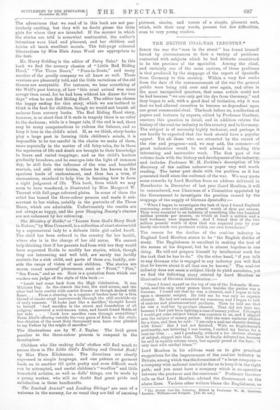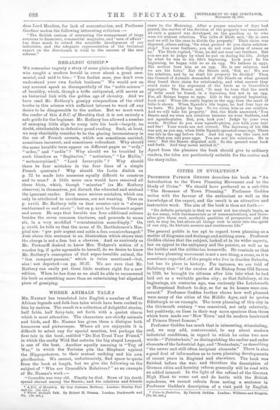THE BRITISH COAL-TAR INDUSTRY.*
81xcE the war the " man in the street " has found himself forced by circumstances to face a variety of problems connected with subjects which he had hitherto considered to be the province of the specialist. Among the chief, and certainly .one of the most curious, of these problems is that produced by the stoppage of the export of dyestuffs from Germany to this country. Within a very few weeks from the date of the commencement of the war the general public were being told over and over again, and often in the most unexpected quarters, that some article could not be had because " we can only get the dye from Germany," and they began to ask, with a good deal of irritation, why it was that we had allowed ourselves to become so dependent upon our great commercial rival. The book before us, a collection of papers and lectures by experts, edited, by Professor Gardner, answers this question in detail, and in addition relates the history of the coal-tar industry in this country and in Germany. The subject is of necessity highly technical, and perhaps it can hardly be expected that the book should have a popular appeal. Yet all those who 11 co attracted by the record of the rise and progress—and, we may add, the romance—of great industries would be well advised in reading this interesting and instructive work. The first part of the volume deals with the history and development of the industry, and includes Professor W. II. Perkins's description of his discovery of the aniline colours—a paper very well worth reading. The latter part deals with the problem as it has presented itself since the outbreak of the war. We may quote some remarks by Lord Moulton from an address delivered in Manchester in December of last year (Lord Moulton, it will be remembered, was Chairman of a Committee appointed by the Government to investigate the position caused by the stoppage of the supply of German dyestuffs} When I began to investigate the lack of dyes I found England consuming some two million pounds' worth of dyes per annum. They were essential to an industry of something like two hundred million pounds per annum, on which at least a million and a half workmen were dependent. And I found that of the two million pounds' worth of dyes that was required year by year barely one-tenth was produced within our own boundaries."
The reason for the decline of the coal-tar industry in England Lord Moulton states to be "the English dislike of study. The Englishman is excellent in making the best of the means at his disposal, but he is almost hopeless in one thing. He will not prepare himself by intellectual work for the task that he has to do." On the other hand, " if you talk to any German who is engaged in any industry you will find that he knows about it all that can .be known." The coal-tar industry does not seem a subject likely to yield anecdotes, yet we find the following story related by Lord Moulton as illustrative of German concentration :— " Once I found myself on the top of one of tho Dolomite Moun- tains, and the only other person there besides the guides was a German. I found out that he was a chemist, and I began to talk upon a chemical subject. He told me he was only an organic chemist. He had not exhausted my resources, and I began to talk of coal-tar and pharmaceutical products. Then lie told me that he was a coal-tar by-product chemist, That did not beat mo, because I had just boon fighting a case of canary yellow. I thought I would get some subject which was common to us, and I slipped into the subject of canary yellow. Still the same ominous silence for a time, and then he said : I am only a coal-tar chemist dealing with blues,' But I had not 4niabscl. With an Englishman's pertinacity, not believing I was beaten, I racked my brains for a coal-tar blue . and I gradually, without a too obvious change of subject, slipped into that, Then he finally defeated me, because he said in equally solemn tones, but equally proud of the fact ; only deal with methyl blues.'" Lord Moulton in his address went on to give practical suggestions for the improvement of the goal-tar industry in Britain, among which was the formation of a large com pany-- a company with national control se far as to keep it in the right path; and you must have a company which is co-operative between the producer and the consumer." Professor Gardner tells ue that Lord Moulton advised the Government on the above lines. Various other writers blame the Englishman, as
* Ths British Coat.Tor Industry. Edited by Professor W. /11. Gardner, London ; Williams and Nortrate, [100, ed, not] . does Lord Moulton, for lack of concentration, and Professor Gardner makes the following interesting criticism :— "The British custom of entrusting the management of large concerns to financiers, commercial magnates, and men of affairs ' has done much to retard the scientifie development of our industries, and the adequate representation of the technical expert on the directorate is vital to the success of the new scheme."















































 Previous page
Previous page